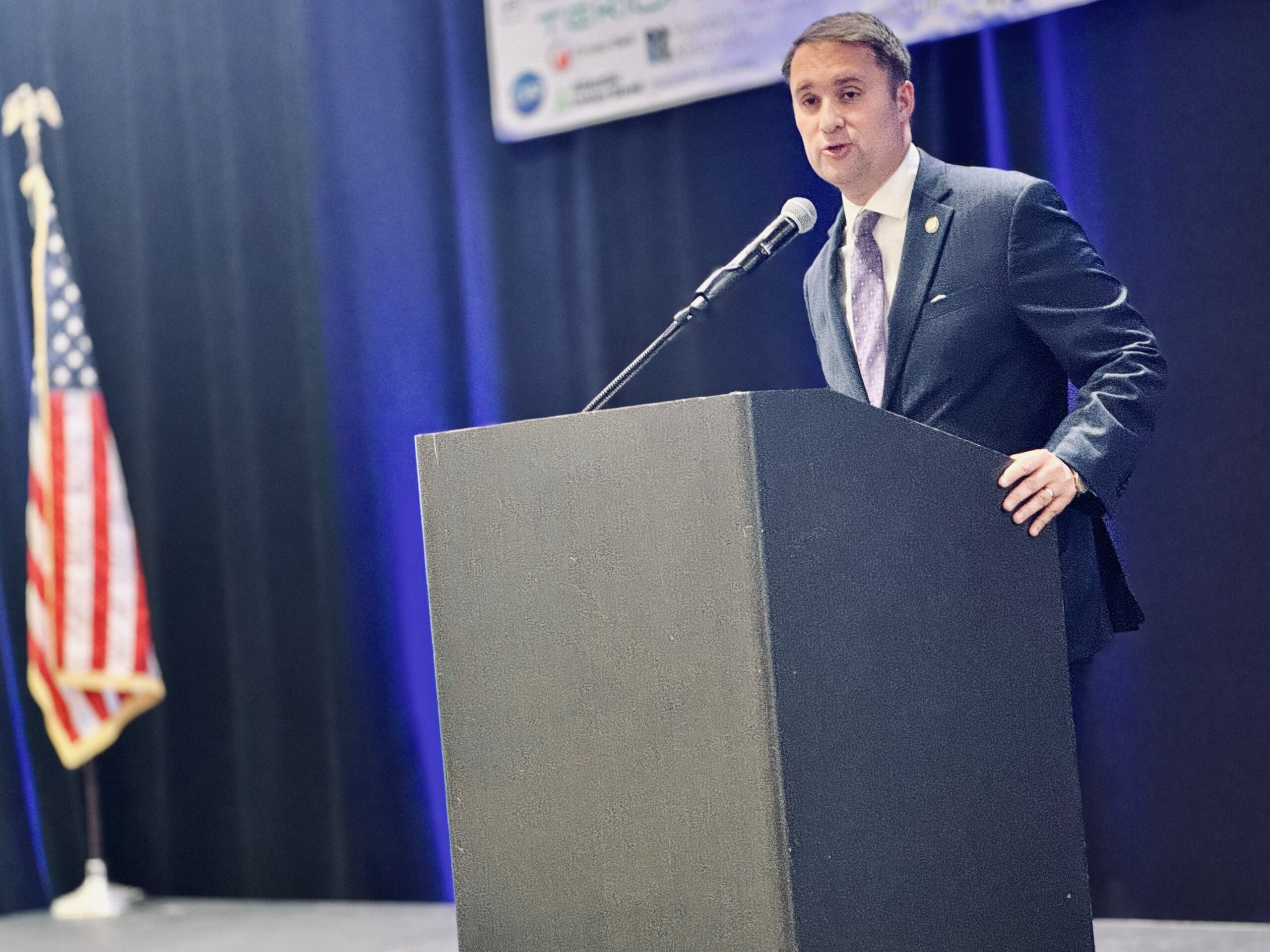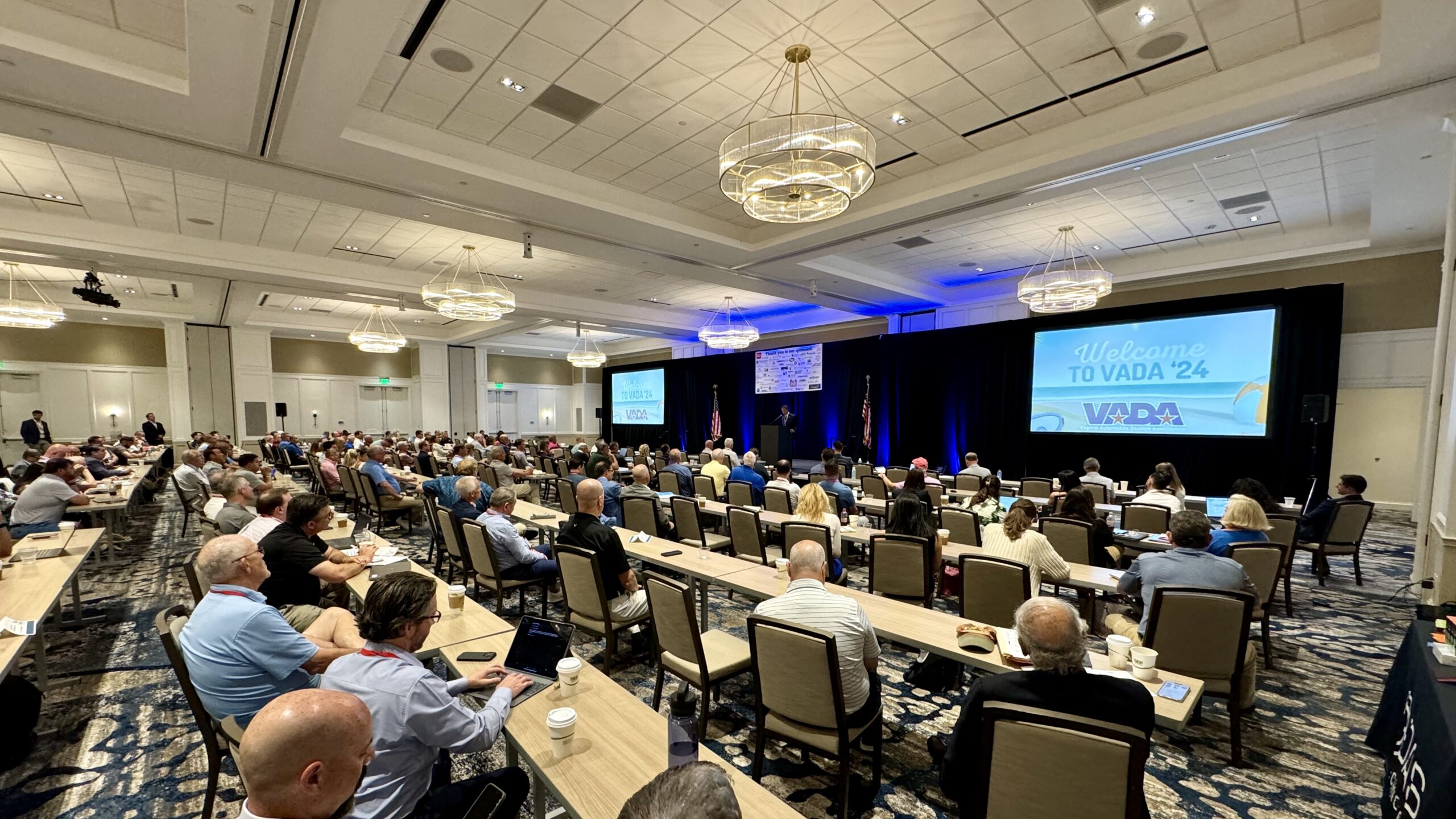Virginia Attorney General delivers remarks to dealers at VADA Convention on EV mandate, challenges to national electrical grid
June 10, 2023
By Jeff Kelley for VADA.com
Cars are freedom.
“They represent the ability to set your own schedule, to get on the open road. So many of our great memories in life are tied to our vehicles,” Virginia Attorney General Jason Miyares told Virginia dealers and industry partners at the VADA Annual Convention on Isle of Palms, S.C. “You represent that idea of freedom. You pair individuals with those dreams and the ability to go chase their freedom.”

Virginia Attorney General Jason Miyares speaks to attendees at the VADA 2024 Annual Convention.
Such freedom and choice set the stage for Miyares’ attendance at VADA ‘24 on the heels of his and Gov. Glenn Youngkin’s announcement that Virginia will exit California’s zero-emissions mandate at the end of this year.
The reason, the administration says, is to not only give Virginians choice in what they drive, but to uncouple the Commonwealth from a mandate that will be impossible to achieve: a 35% adoption rate of EVs by 2026, when current EV penetration is only 9%.
Miyares said the language of Virginia’s law on the EV mandate was not properly drafted, interpreting the law as voluntary, not mandatory. “The Governor made the right decision that we're going to have consumer choice back in Virginia,” he said.
As Miyares noted: States can choose to follow the California standards or the corresponding and more lenient federal standards regarding low-emissions vehicles under the Environmental Protection Agency’s Clean Air Act. Unlike California, federal regulations only pertain to emissions, not a particular type of drivetrain. The EPA mandate requires only 67.5% of new U.S. car sales be fully electric by 2032, leaving a significant amount of opportunity for new hybrid and internal-combustion vehicle sales.
In developing Clean Air Act rules, the federal government gave California an exception and allowed it to create its own standards. In 2012, the California Air Resources Board (CARB) instituted “Advanced Clean Cars I,” a set of regulations to reduce emissions and increase the number of zero-emissions vehicles, or ZEVs.
In 2021, the Virginia General Assembly passed legislation authorizing Virginia’s Air Board to adopt Advanced Clean Cars I. In 2022, however, CARB adopted “Advanced Clean Cars II,” set to take effect January 1, 2025. Its mandate is more aggressive, requiring 100% of new cars sold in Model Year 2035 to be electric — starting at 35% of all new vehicle sales with model year 2026. If an auto manufacturer doesn't meet that threshold, they could be penalized.
Critics of the repeal, Miyares said, say the intent of the law is not to force drivers into EVs.
In the General Assembly, however, “we don't govern on intentions, we govern on plain language. One day there's going to be a judge [who is] going to try to determine what we just did to the Virginia code. They're not going to have the benefit of what the patron of the bill intended, or the benefit of what was discussed in committee,” Miyares said. “They're going to have the plain language that is sitting right there in a bill that becomes incorporated into the code.”
On the grid
Miyares also discussed national challenges with the electric grid. He said there are 60 million electric transformers in the U.S., which last between 40 and 50 years and serve as a key element to delivering electricity. Most transformers average about 40 years old, he said. In other words: we need millions of transformers.
At any one time, the U.S. uses 1,250 gigawatts of energy. “To get where we need to go, we need to add an additional 2,000 gigawatts minimum,” he said. “Virginia needs twice our energy capacity in the next 10 years.”
The grid is being stressed on needs beyond EVs, too. Artificial intelligence algorithms use 15 times more energy than a Google search, Miyares said.
And in Virginia, a significant number of electric-intensive data centers are being located in the state. “We have big challenges in Virginia moving forward,” he said. “And it also means we have to be very, very honest about where our grid is and where it can be in 10 years.”
To get there will take investment and innovation — and without it, the U.S. faces “energy poverty” that could fast lead to an economic downturn, he said. “If you have energy poverty, you reach a point like we did in the 1970s where our energy capacity was not able to meet our energy demands, and it led to close to a decade of struggling economic growth in this country.”
He said elected officials should be pursuing solutions to create more grid capacity. “Otherwise, what will happen is there will be a cutback on our energy capacity, and the impact on our economy can be catastrophic,” he said.
On EVs
Despite the end of the Virginia emissions mandates, EVs will remain part of the mix of vehicle options going forward, “as they should,” Miyares said.
But Miyares also cited a statistic shared moments earlier by Cox Automotive’s Brian Finkelmeyer, who noted that the average monthly payment on a vehicle is $775 — and only half of all Americans can afford even a $400 monthly payment, which equates to a $20,000 vehicle. The average new vehicle transaction is over $47,000, according to Cox.
EVs also aren’t exactly environmentally friendly, he noted. They are dominantly powered by fossil fuels, and the components to create the batteries take a toll on the environment and, at the moment, are reliant on Chinese manufacturing plants powered by coal.
“We're talking about a magnitude more of carbon that is emitted to make a single electric vehicle compared to a traditional [or hybrid] one,” he said. “The energy content required to mine these materials, frankly, is staggering. That's not to denigrate electric vehicles. It means we should have an honest discussion about what they are, and not wishing what they could be.”
Still, Miyares noted, he remains optimistic and is relying on American ingenuity, not politics, to reach the nation’s energy goals.
“Technology can solve a lot of problems that we’re seeing,” he says. “But I also think it's important that we hold our elected leaders accountable, that we don't allow them to get away with, ‘Well, I intended to…’ That’s not how anybody should operate their life.”

